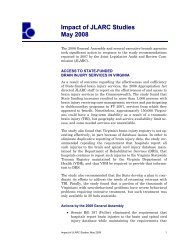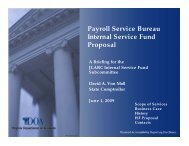Funding of Constitutional Officers - Virginia Joint Legislative Audit ...
Funding of Constitutional Officers - Virginia Joint Legislative Audit ...
Funding of Constitutional Officers - Virginia Joint Legislative Audit ...
You also want an ePaper? Increase the reach of your titles
YUMPU automatically turns print PDFs into web optimized ePapers that Google loves.
Service Equity. The first goal used to develop a more systematic funding<br />
system was service equity. Service equity means that all citizens should have equal<br />
access to certain services provided by constitutional <strong>of</strong>ficers. Accordingly, JLARC staff<br />
developed the following definition <strong>of</strong>service equity for use in the study:<br />
Service equity is the provision <strong>of</strong>the resources necessary for meeting<br />
the recognized workload requirements <strong>of</strong> all constitutional <strong>of</strong>ficers.<br />
Objective measures should be used to estimate the resources necessary<br />
to provide State-recognized workload levels.<br />
This definition <strong>of</strong>service equity addresses both horizontal and vertical equity.<br />
Essentially, horizontal equity requires that <strong>of</strong>fices with the same circumstances and<br />
requirements be treated equally in terms <strong>of</strong> funding, while vertical equity requires<br />
that <strong>of</strong>fices with different circumstances and requirements be treated differently. To<br />
achieve the service equity goal, resources must be available to meet the recognized<br />
workload in all localities, including the special requirements <strong>of</strong> certain localities.<br />
To ensure that services are provided for in all localities, the State can base its<br />
funding for services on objective measures <strong>of</strong>workload. The objective measures should<br />
be sensitive to special staffing requirements due to factors beyond local control. Thus,<br />
the purpose <strong>of</strong> the service equity goal is to treat localities with fundamentally equal<br />
workload as equals, yet to recognize differences due to circumstances beyond local<br />
control.<br />
Tax Equity. In addition to ensuring that services are provided, the State can<br />
also ensure that it treats localities fairly in its financial support <strong>of</strong> services. This is<br />
done by: (1) accepting responsibility for State-mandated costs and (2) recognizing the<br />
relative abilities <strong>of</strong> local governments to raise revenue to pay for mandated services.<br />
JLARC staffdeveloped the following definition <strong>of</strong> tax equity for this study:<br />
Tax equity is the appropriate assignment <strong>of</strong>responsibility for Staterecognized<br />
service costs <strong>of</strong> constitutional <strong>of</strong>ficers. This assignment<br />
can be either primarily State, primarily local, or shared State-local<br />
cost responsibility. For shared cost responsibility services, when<br />
apportioning the State and local shares <strong>of</strong> the costs, each local<br />
government's ability to generate revenues should be taken into account.<br />
This definition was operationalized in two parts. The first part involves the<br />
development <strong>of</strong> a framework for determining what services should be paid for primarily<br />
by the State, primarily by the local governments, or by both. The framework is<br />
based on an assessment <strong>of</strong> mandates for services, and the level <strong>of</strong> government which<br />
benefits from the services.<br />
In the second part <strong>of</strong> tax equity, the services to be shared by both the State<br />
and local governments are separated into the specific shares to be paid. A major<br />
component <strong>of</strong> this second step was the identification <strong>of</strong> a method for recognizing<br />
7














